Lemon-Ginger Tea: Health Benefits, Nutrition, and FAQs
Discover how lemon-ginger tea supports digestion, immunity, weight management, and more, plus nutrition facts and frequently asked questions.

Lemon-ginger tea is a popular herbal infusion celebrated for its vibrant flavor and potent health-supporting properties. Combining the zesty tang of lemon with the soothing warmth of ginger, this caffeine-free beverage has been cherished worldwide for centuries in traditional and modern wellness routines.
What Is Lemon-Ginger Tea?
Lemon-ginger tea is an herbal drink made by steeping fresh or dried ginger root and lemon juice or slices in hot water. Known for its spicy-citrus taste and comforting aroma, this beverage is enjoyed both for its flavor and its potential health benefits. You can prepare it using fresh ingredients, tea bags, or instant powders, with optional add-ins like honey, turmeric, or mint to customize flavor and benefit profile.
Nutritional Profile of Lemon-Ginger Tea
Both lemon and ginger are naturally rich in antioxidants and micronutrients. However, the levels of these nutrients in a brewed cup of tea depend on the preparation method and serving size. Here’s a closer look:
| Nutrient | Amount (8 oz, unsweetened)* |
|---|---|
| Calories | 0–14 |
| Total Fat | 0 g |
| Sodium | 0 mg |
| Total Carbohydrates | 0–4 g |
| Sugars | 0 g |
| Protein | 0–0.2 g |
| Vitamin C | up to 23 mg |
| Potassium | 60–160 mg |
| Vitamin B6, Magnesium | Trace |
*Values vary based on fresh or dried ingredients, and exclude added sweeteners.
When unsweetened, lemon-ginger tea is practically calorie-free, with only trace nutrients. Fresh preparations provide slightly more vitamin C and potassium due to the natural juice and pulp.
Top Health Benefits of Lemon-Ginger Tea
Enjoying a daily cup of lemon-ginger tea can provide several health benefits, supported by both traditional use and growing scientific evidence:
- Digestive Support: Ginger is famed for its ability to soothe nausea, reduce indigestion, and ease bloating. Lemon adds gentle acidity, helping stimulate saliva and digestive secretions.
- Relief from Nausea: Studies confirm that ginger helps relieve nausea from motion sickness, pregnancy, and chemotherapy, especially when taken as part of lemon-ginger tea.
- Immune System Boost: Both lemon (rich in vitamin C) and ginger (packed with gingerol and antioxidants) bolster immune defenses and may lower the risk of infections.
- Anti-inflammatory Effects: Ginger contains gingerol, which has natural anti-inflammatory qualities, helpful for easing pain, swelling, and symptoms of arthritis.
- Weight Management: Drinking lemon-ginger tea may support weight loss efforts. Ginger increases satiety and moderates hunger, while lemon may help enhance insulin sensitivity and reduce fat accumulation.
- Heart Health: Lemon and ginger both contribute nutrients and compounds (flavonoids, antioxidants) that support circulation and may reduce the risk factors for cardiovascular disease.
- Blood Sugar Regulation: Both ingredients are low on the glycemic index and may help stabilize blood glucose, especially when consumed unsweetened.
- Liver Protection: Some compounds in lemon and ginger are believed to support liver health and offer protection against certain toxins.
- Pain Relief: Ginger has traditionally been used for natural pain relief, from menstrual discomfort to muscle soreness, and drinking it as part of a tea may enhance these effects.
- Hydration: As a hot, water-based beverage, lemon-ginger tea helps maintain daily fluid balance, essential for organ function and overall health.
- Potential Cancer Protection: Preliminary studies suggest the antioxidants in ginger and lemon may help protect cells from some types of cancer, though more research is needed.
How Lemon-Ginger Tea Supports Your Body
Let’s dive deeper into the science and tradition behind some of these key benefits:
1. Eases Nausea and Digestive Upset
Whether you’re prone to motion sickness, recovering from illness, or dealing with morning nausea during pregnancy, ginger’s natural compounds (like gingerol and shogaol) help reduce queasiness and support digestive comfort. Lemon provides additional gentle acidity that may aid in stimulating digestive processes. Multiple clinical trials and reviews support ginger’s effectiveness at easing various types of nausea and improving overall digestive health.
2. Soothes Inflammation and Pain
Ginger acts as a natural anti-inflammatory, potentially reducing joint pain, muscle aches, and even headache severity. Its active compounds work in ways similar to common NSAIDs (nonsteroidal anti-inflammatory drugs), such as ibuprofen, but with fewer side effects. Lemon provides further antioxidant support, helping to neutralize free radicals in the body.
3. Strengthens Immune Defenses
Lemon-ginger tea is a rich source of immune-friendly vitamin C, which is vital for white blood cell production. The tea’s antioxidants (including those in ginger) curb oxidative stress, potentially lowering your risk of getting infections such as the common cold or flu.
4. Promotes Heart and Metabolic Health
Research suggests that ginger may help reduce cholesterol, regulate blood pressure, and counter some metabolic syndrome risk factors. Lemon’s bioflavonoids may also protect blood vessels and support healthy blood flow, while both ingredients can assist in blood sugar management and weight control.
5. Enhances Hydration and Wellness
Staying hydrated is essential for every organ system. Lemon-ginger tea supplies flavorful hydration, which may encourage more frequent, adequate fluid intake throughout the day.
Who Should Drink Lemon-Ginger Tea?
Lemon-ginger tea is safe for most people and can be enjoyed at any time of day. It is especially helpful for:
- Adults and children dealing with mild digestive upset
- Individuals seeking immune support, especially during cold and flu season
- Those interested in weight management and metabolic health
- Anyone looking for a flavorful, caffeine-free alternative to traditional tea or coffee
If you are pregnant, have a bleeding disorder, or take blood-thinning medications, consult your healthcare provider before drinking ginger tea regularly, as ginger may affect blood viscosity.
How to Make Lemon-Ginger Tea at Home
Making lemon-ginger tea at home is simple, cost-effective, and allows you to control the strength and flavor. Here’s a basic recipe:
- Ingredients:
- 1–2 inches of fresh ginger root, sliced or grated
- 1–2 tablespoons fresh lemon juice (or a few lemon slices)
- 2–3 cups water
- Optional: Honey or other natural sweetener to taste
- Optional: Turmeric or a pinch of black pepper for enhanced benefits
- Instructions:
- Bring water to a gentle boil.
- Add ginger and simmer for 5–10 minutes, depending on desired strength.
- Remove from heat and add lemon juice or slices.
- Strain, pour into a mug, and sweeten as desired.
Possible Side Effects and Precautions
Lemon and ginger are both recognized as safe for healthy adults when consumed in common food and beverage amounts. However, some people may experience mild side effects or need to take precautions:
- Blood Thinning: Ginger may have a mild blood-thinning effect. Individuals on prescription blood thinners (e.g., warfarin) should consult their healthcare provider before consuming large amounts.
- Stomach Sensitivity: Excess ginger or lemon may irritate sensitive stomachs, especially when consumed in large amounts or on an empty stomach.
- Blood Sugar: If you have diabetes or are monitoring carbohydrate intake, avoid adding sugars, honey, or other sweeteners to your tea.
- Dental Enamel: Lemon is acidic and can erode dental enamel over time. Rinse your mouth with water or use a straw when drinking lemon-based beverages frequently.
Most people experience no side effects when enjoying lemon-ginger tea in moderation.
Frequently Asked Questions (FAQs)
Q: Can lemon-ginger tea help with weight loss?
A: Yes. Ginger has properties that may increase satiety and reduce hunger, while lemon may improve insulin sensitivity, supporting weight management when combined with a healthy diet.
Q: Is it safe to drink lemon-ginger tea every day?
A: For most healthy adults, daily consumption of lemon-ginger tea is safe and beneficial, unless you have conditions requiring limited ginger intake (such as blood disorders) or allergies to either ingredient. Discuss with your healthcare provider if you have concerns.
Q: Can lemon-ginger tea prevent or treat colds?
A: While it cannot cure a cold, the vitamin C in lemon and the immune-supporting compounds in ginger may reduce symptom severity and duration. It can provide soothing relief and hydration during illness.
Q: Does lemon-ginger tea have caffeine?
A: No. Lemon-ginger tea is a naturally caffeine-free herbal infusion, making it suitable for drinking any time of day or night.
Q: Are there any interactions with medication?
A: Ginger can interact with some blood-thinning medications and may not be suitable for certain health conditions. Always consult your healthcare provider if you are taking medication or have a chronic health concern.
Tips for Enjoying Lemon-Ginger Tea
- Try adding a dash of honey or maple syrup if you prefer a sweeter flavor—just be mindful of total sugar intake.
- For an extra wellness boost, add a pinch of turmeric and black pepper to enhance bioavailability of beneficial compounds.
- Chill brewed lemon-ginger tea over ice for a refreshing, hydrating beverage in warm weather.
- Use organic lemons and ginger when possible to minimize pesticide residues in your cup.
- Prepare a large batch and store in the refrigerator for easy access throughout the week; enjoy hot or cold.
Conclusion
Lemon-ginger tea is more than just a soothing and flavorful beverage—it is a centuries-old herbal remedy with modern-day health benefits, ranging from digestive support to immune enhancement and heart health. Easy to prepare and naturally caffeine-free, it is a versatile drink suited to almost anyone’s daily routine. Remember to use quality ingredients and enjoy in moderation for the best experience and results.
References
- https://www.medicinenet.com/13_benefits_of_lemon-ginger_tea_before_bed/article.htm
- https://www.signos.com/blog/benefits-of-lemon-ginger-tea
- https://www.webmd.com/diet/health-benefits-lemon-ginger-tea
- https://www.healthline.com/nutrition/lemon-ginger-tea-before-bed
- https://www.bigelowtea.com/products/lemon-ginger-plus-probiotics-herbal-tea
- https://www.prevention.com/food-nutrition/a62979465/lemon-ginger-tea-benefits/
Read full bio of Sneha Tete












